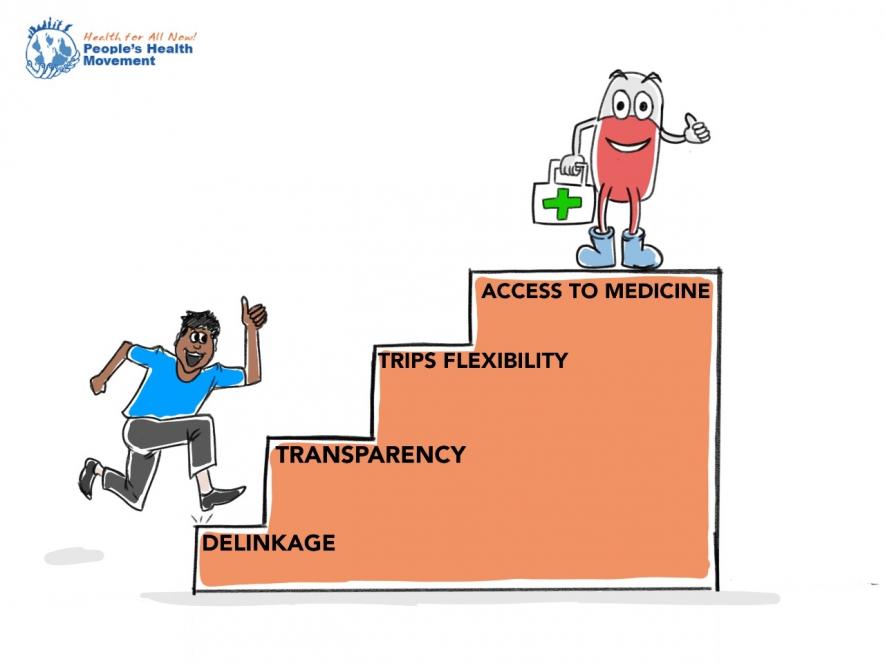The Road to Access – Discussions on Medicines at 71st World Health Assembly

The article below is part of the ‘WHO-Watch’ program which is an effort of the People’s Health Movement WHO-Watch program. The program works towards democratising global governance for health and involving young activists in following the governing body meetings of the World Health Organisation -- the Executive Board meeting in January and the World Health Assembly in May -- every year.
The debate around access to medicines within the WHO comes with a long and complicated history, and it is usually one of the most hotly debated topics during the organisation’s high-level meetings. At this year’s World Health Assembly, we observed yet another chapter of the struggles and efforts in paving the way towards making, medicines accessible for populations around the world.
The core of this year’s debate revolved mostly around the two main agenda items. The first one, ’Addressing the global shortage of, and access to, medicines and vaccines’ covers most of the general debate on access, while the other ‘Global Strategy and Plan of Action (GSPOA) on public health, innovation and intellectual property’ brings in a more technical discussion focused on intellectual property rights in the context of R&D of medicines for diseases affecting populations in developing countries. Lastly, issues connected to access were also touched upon during the debate on snakebite burden, ending tuberculosis, and rheumatic fever and rheumatic heart disease.
So, what was being discussed? The debate on access is usually centred on a number of key recurring themes such as intellectual property rights, national capacities for Research & Development and innovation, funding and political commitment and intellectual property once again.
This year, perhaps in line with the overall theme of the Assembly and the newly adopted Global Programme of Work, a place at the forefront was granted to linking the issues of access together with the Universal Health Coverage and Sustainable Development Goals. Needless to say, a large number of Member States, the WHO’s Secretariat and the Director-General himself highlighted this link in their addresses to the Assembly, and rightly so as access to medicines and vaccines undoubtedly is, indeed, a key issue and pillar to achieving Universal Health Coverage as well as targets of Sustainable Development Goals. What we would be more interesting to see, however, are concrete steps in terms of how this crucial link can be transformed into meaningful action towards ensuring access.
The Access to Medicines Roadmap
Going into a more focused analysis of the individual topics, in terms of the first topic (Shortage of, and access to, medicines and vaccines), the Executive Board in January decided to address the issue of access debates at WHO with a broad whole-of-supply-chain canvas. The decision set to be made at the WHA was to request the Director-General to elaborate a roadmap report outlining the programming of WHO’s work on access to medicines and vaccines, including activities, actions and deliverables for the period 2019 to 2023.
If adopted, the roadmap report would then to be submitted to WHA72 next year through the Executive Board taking place next January. The document presented to the Assembly A71/12 listed WHO’s actions on the recommendations of the United Nations High Level Panel on Access to Medicines report (which was published in 2016 and since then wasn’t substantively debated within WHO, which caused controversies during the previous WHAs), and summarised relevant work currently undertaken by the Secretariat in this regard. The roadmap itself - if done right - could be a crucial milestone in tackling the global crisis of lack of access to medicines.
Even though most of the present member states endorsed the suggested roadmap and dedicated their statements to ideas of what should be included, the US delegations raised some reservations in this regard. In their statement, they expressed their disappointment in the approach taken by the secretariat with regards to this issue and highlighted that the Assembly is currently working towards something that does not have a consensus among the Member States, hinting at the area of IP protection and international trade. They highlighted that WHO was going beyond its mandate with regards to this issue and questioned the legitimacy of the High-Level Panel recommendations. Possibly because of the strong statement of the United States, the Secretariat suspended the access to medicines agenda item (perhaps to calm the waters slightly before voting on adopting the decision). The following day, the decision to develop the roadmap was adopted and the agenda item was closed. All access to medicines' eyes is therefore directed towards Geneva now as the organisation will start working on drafting the roadmap soon.
GSPOA: The question of funding and implementing new research and development
With regards to the global action plan on intellectual property rights (GSPOA), a draft decision to implement recommendations of its review, the ‘’Overall Programme Review (OPR)’’ was presented. This would authorise the DG to develop and enact an implementation plan of priority actions listed in the report. Ten years after its introduction, the implementation of GSPOA remains limited largely due to the lack of awareness and lack of funding directed towards the programme. The lack of implementation and funding formed the centre of the debate itself.
While some states (Argentina, India) called for providing resources for action and urged for greater bilateral and regional collaboration, USA supported the decision points of GSPOA and called WHO upon working towards strengthening of regulatory mechanisms highlighting that capacity enhancement is necessary among MS. This links back to the strong statement the US made on the first access to medicines item, in which they emphasized that their disagreement with countries is on freely benefiting from R&D and innovations from the roadmap or any such similar initiative. Germany emphasized the importance of patents, while Korea, Indonesia or Iran (among other countries), repeated the need for implementation of the United Nations High-Level Panel recommendations for making medicines accessible. Overall, there were no objections to the draft document and the decision was approved.
Other key highlights from across the topics
Support of new technologies development
The WHO’s role in the development of new health technologies in collaboration with countries for local productions was raised a number of times during in the session. The representative of Paraguay urged the WHO to strengthen regional systems and transfer of technologies between countries, including by stimulating local initiatives for production of health technologies.
Call for better regulatory frameworks
The development of better regulatory frameworks was a key message from the African states' interventions in the second session. Delegations from AFRO region raised the importance of harmonization of regulatory mechanisms on the continent and called for WHO’s support and technical assistance in this regard. On the other hand, some delegations, such as US and Switzerland, remarked the importance of IP protection.
Transparency
Some countries stated in favour of transparency regarding different aspects of the development of medicines. Portugal stressed that access to medicines should be taken as a Human Rights issue and urged for WHO’s work on transparency in all the value chain. In the same way, Malaysia urged WHO to support MS in pricing transparency and development for platforms for medicines pricing. The topic of transparency is a key to both the roadmap being developed and the full implementation of the GSPOA.
Antimicrobial Resistance
Some delegations raised the importance of inclusion of Anti-Microbial Resistance in the current development of the roadmap. The representative of Thailand, for instance, proposed an amendment to include the support towards research and development in dealing with AMR.
Take home messages & Ways forward
After, the ever-so-slight backlash of the United States and a couple of other countries with a large presence of pharmaceutical industry, the decision to develop a roadmap report, which will contain clear deliverable targets towards the progress of addressing access to medicines, was successfully adopted. With regards to GSPOA, the decision to allow the DG to enact the full implementation plan according to the priorities set was adopted too. In this regard, this year’s WHA seems to have delivered on its goals. However, deep geopolitical divide across countries with different interests and priorities remain and we must be prepared for it to play a key role in the upcoming meetings to finally address and resolve the matter of medicines.
The above article is compiled with contributions from; Linda Markova (UK), Kriti Shukla (India), Natasha Matthews (UK), Simrin Kafle (Nepal), Dan Owalla (Kenya), Emmanuel Tangumonkem (Cameroon), Alba Lop Girones (Spain), Matheus Falco (Brazil), Sophie Gepp (Germany/UK), Sherif Olanrewaju (Nigeria), Andrew Harmer (UK) and Ana Vračar (Croatia).
This article is part of a series. Read Part 1 here.
Part 2 here.
Part 3 here.
Part 5 here.
Get the latest reports & analysis with people's perspective on Protests, movements & deep analytical videos, discussions of the current affairs in your Telegram app. Subscribe to NewsClick's Telegram channel & get Real-Time updates on stories, as they get published on our website.























